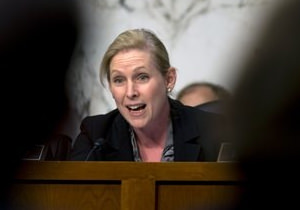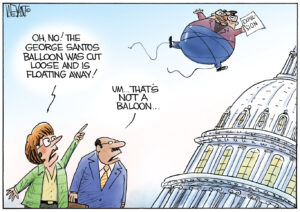Gillibrand’s Student Loan Proposal Follows Warren’s Lead
The Democratic senator from New York has proposed legislation that would allow holders of student debt to refinance their loans at lower interest rates, a move that could save tens of millions of borrowers a combined $14.5 billion in the first year.
Sen. Kirsten Gillibrand, D-N.Y., has proposed legislation that would allow holders of student debt to refinance their loans at lower interest rates, a move that could save tens of millions of borrowers a combined $14.5 billion in the first year. Under the plan, government loans with interest rates above 4 percent would be refinanced to a fixed rate of 4 percent.
“At a time when corporations, homeowners and even local governments are refinancing at historically low interest rates and saving millions of dollars, students and families who take out loans to pay for college are getting left behind,” she said. “Ensuring that our graduates are not saddled with unmanageable debt by keeping interest rates low is just common sense.”
Gillibrand’s move comes less than two weeks after Sen. Elizabeth Warren, D-Mass., introduced a bill that would effectively give new students seeking federal loans to finance their education the same low interest rates as the bailed out Wall Street financial institutions.
Think Progress:
Holders of federal student loans haven’t seen a drop in their interest rates even as other borrowing costs have fallen. Many loans have interest rates of 6.8 or 7.9 percent, while the interest rate for the average 30-year, fixed-rate mortgage is 3.5 percent.
And as Sen. Elizabeth Warren (D-MA) recently pointed out, banks have even lower borrowing costs when they come to the federal government to borrow. They can get an interest rate of 0.75 percent on loans through the Federal Reserve discount window. Warren has also introduced a bill to address high levels of student debt by calling for student loan rates to mirror those that benefit banks.
…The Center for American Progress estimated that Gillibrand’s legislation would save borrowers $14.5 billion in the first year, leading to a $21.7 billion boost in economic activity.
— Posted by Tracy Bloom.
Your support matters…Independent journalism is under threat and overshadowed by heavily funded mainstream media.
You can help level the playing field. Become a member.
Your tax-deductible contribution keeps us digging beneath the headlines to give you thought-provoking, investigative reporting and analysis that unearths what's really happening- without compromise.
Give today to support our courageous, independent journalists.






You need to be a supporter to comment.
There are currently no responses to this article.
Be the first to respond.